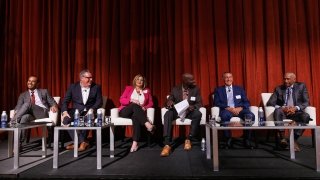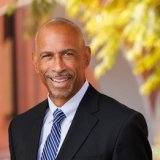The COVID-19 pandemic began over two years ago, and throughout its course, many school superintendents have had to adapt and modify the way they manage their districts. On Aug. 26, education leaders and administrators from Southern California convened for USC Rossier’s first Melbo Lecture to discuss the current reality of education. Led by new Irving R. Melbo Chair Maria G. Ott, the gathering centered on the theme “Leading in Times of Radical Change: An Invitation to Lead for a New Future.”
“It takes courage to embrace change and confidence in one’s ability to navigate forward,” said Ott in her opening remarks. “If we are honest, we have to admit that there was a need to do things differently before this pandemic, and radical change was made possible by its disruptions.”
Featured speakers included Daniel A. Domenech, executive director, American Association of School Administrators (AASA); Ben Drati, superintendent, Santa Monica-Malibu Unified School District; Paul Gothold EdD ’17, superintendent, San Diego County Office of Education; and Ruth Pérez, deputy superintendent, Riverside County Office of Education. Pedro A. Noguera, Emery Stoops and Joyce King Stoops Dean of the USC Rossier School of Education, and Edgar Zazueta EdD ’18, executive director, Association of California School Administrators, moderated the lecture, which is to become an annual event.
“At USC Rossier, the way we learn about leadership is by learning from our leaders,” said Dean Noguera. “We then figure out how to be the resource that leaders need to do the work they do.”
What was learned over the past two years? How did leadership evolve? What keeps superintendents motivated to do their job? The panel shared perspectives and offered practical advice.
- Build a coalition and empower teams. When the challenges hit in the early days of the pandemic, superintendents found ways to activate existing relationships in a different way. In San Diego, Paul Gothold and his team provided internet access to 77,000 students in a short amount of time. “Some of the greatest ideas have come out of this time,” said Gothold. “Instead of accepting defeat, turn it into something really unique and positive. Something that doesn’t exist.”
- Take advantage of the opportunity to become a leader. Over the course of the pandemic, many schools saw a decrease in staff and teacher morale. “This is a time to rebuild in a unique and strategic way,” said Ruth Pérez. In Riverside County, Pérez and her colleagues examined how outside, high-stress organizations like the airline and medical industries managed crisis. They adapted what they discovered and applied what was learned to help sustain current and future leaders in the superintendency and principalship.
- Invite the community into the conversation. The Santa Monica-Malibu Unified School District was one of the first districts to close in the beginning of the pandemic. Ben Drati was both praised and criticized for that decision; he found inviting stakeholders to build consensus was the solution. “When you’re trying to get to a certain outcome and you’re working together, relationships are built; respect is established amongst the people who are in the game. If you’re successful, what happens is you’re closer than ever.”
- Stay motivated and remember the impact on students. Superintendents faced several challenges over the past two years. How do leaders stay motivated? “To be a superintendent is a calling,” Pérez added. Panelists agreed that it takes conviction to do the right thing, and that the greatest reward is their impact on the lives of students.






